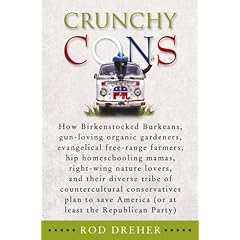Crunchy Cons
Anyone who knows me knows how much I like to avoid labels like "liberal" and "conservative," simply because they have a limited value, and mean different things to different people. An example: My hero, Pope John Paul II, was pretty conservative in a lot of ways. Yet he sometimes staked out positions that put him in the same camp as flaming liberals. So what was he? Liberal or conservative? This is the perfect evidence for the weakness of the labels.
Well, I just discovered a label that I am (somewhat) more comfortable applying to myself: Crunchy Conservative. ("Crunchy", as in "granola"...) Of course, like all labels, it has its shortcomings, and is an umbrella term that may apply to various disparate individuals. But author Rod Dreher seems to have tapped into a segment of the "conservative" population that tends to, in a sense, vote Republican all the while holding their nose as they do, because they're "conservative", yet feel somewhat outside the mainstream of the conservative movement, which at times seems far too wedded to the interests of big business, among other things. It all started with an article he wrote in the National Review entitled, Birkenstocked Burkeans: Confessions of a Granola Conservative Here's a few snippets of the article:
Talking with a conservative friend the other day, I mentioned that my wife and I were having a friend over to dinner, and were going to serve him all kinds of delicious vegetables from the organic food co-op to which we belong.The article goes on to tease out, quite humorously, a few other ways that Rod and his wife are strange bedfellows with liberals. Things like homeschooling and a distaste for cookie-cutter box houses in pedestrian-unfriendly suburbs.
"Ewgh, That sounds so lefty," she said. And she's right. We're probably the only Republicans who subscribe to this service, which delivers fresh vegetables once weekly to our neighborhood from farms out on Long Island, and at a good price. But so what? Are lefties the only ones allowed to consume quality produce? We made fun of our liberal friends who did this stuff last summer, until we actually tasted the vegetables they got from the farm. We're converts now, and since you asked, I don't remember being told when I signed up for the GOP that henceforth, I was required to refuse broccoli that tastes like broccoli because rustic socialist composters think eating it is a good idea.
...
All I can tell you is that the crunchy-granola lefties are often right about little things that make life richer. Take food, for example. After we married, Julie and I had to teach ourselves how to cook. We quickly discovered how much better food tastes if it hasn't been processed. We'd go to farmers' markets in the city to buy produce, and before we knew it, we were making and canning our own apple butter. Not only did the stuff taste dramatically better than what was on offer in the supermarket, but there was a real sense of pride in knowing how to do these things for ourselves, like our grandmothers did. We realized one day that pretty much the only young to middle-aged people we knew who cared about these things were ... lefties.
The article was such a hit that Rod expanded on it and went on to write a book:

Having just devoured the book myself, I was quite impressed. What first drew my attention was the statement on the dust jacket: "What do you call people who vote for Bush but shop at Whole Foods? Crunchy cons." I thought to myself, "Hey, we voted for Bush, and we sometimes shop at Whole Foods (an organic food store). I guess he's talking about us!" I won't defend every position Rod takes, but by and large he has the right idea. He is trying to point out that conservativism doesn't just mean lower taxes. There's a whole other tradition of conservativism that would look to thinkers such as Russel Kirk, G.K. Chesterton, and, yes, John Paul II for guidance. People who understand that a virtuous culture is the most important thing. And that it's okay to "conserve" things, like the environment. And that technology and the free market are good things, but are good only to the extent that they serve humanity, specifically the family. Any time they begin to infringe upon humanity, then they are not being used properly.
I'll let you read the book yourself. It's not without its imperfections, but let's just say it's made enough of an impression upon me that, for the first time ever, I'm willing to attach a label to myself. I'm a Crunchy Con!

0 Comments:
Post a Comment
<< Home